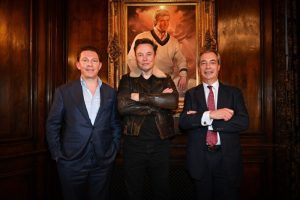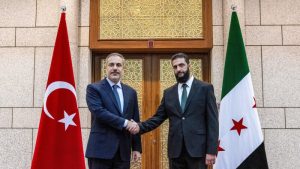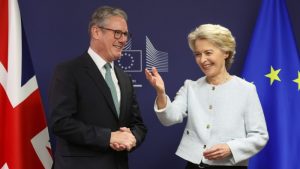Labour-aligned think-tank urges Keir Starmer to set UK immigration target
Unlock the Editor’s Digest for free
Roula Khalaf, Editor of the FT, selects her favourite stories in this weekly newsletter.
A think-tank with close links to Sir Keir Starmer’s Labour administration has called on the government to set a numerical target on immigration into the UK, despite the prime minister dismissing “arbitrary caps” on migration.
Labour Together, whose former head is now Starmer’s chief of staff, said the UK should set “long-term targets” that include an “emergency brake” on people entering the country if numbers look likely to overshoot.
“The plan would set credible, long-term targets that lead to sustained reductions in the level of immigration, while ensuring that Britain’s economic needs are met,” the think-tank said in a report.
The proposal comes after official data last month showed a post-pandemic surge in legal immigration into the UK was even larger than previously thought, reaching a record 906,000 in the year to June 2023.
Starmer, who came to office with Labour’s landslide general election victory in July this year, used the figures to accuse the previous Conservative government of conducting an “experiment in open borders”.
But the prime minister did not set a numerical target for reducing migration to Britain as one of his six “milestones” that Starmer said the public should judge his performance against.
He has said “the British public want a serious plan to ensure we’ve got control of our borders, not arbitrary caps, not gimmicks”.
Immigration to the UK has fallen recently following visa restrictions introduced by the Tories, but it is still higher than historical norms.
Labour Together said the government should set clear targets for inward migration through particular visa routes, taking account of likely flows on humanitarian routes, labour shortages, the case for supporting particular sectors and the impact on housing, infrastructure and public services.
The system would include an overall number for desired immigration over several years as well as sub-targets for different visas. If the overall multiyear target looked set to be exceeded, parliament would debate options to reduce the numbers as a form of “emergency brake”, the think-tank said.
The proposals mirror the approach of countries such as Australia, which publishes a forecast, rather than a target, for overall net migration, and sets the number of permanent visas to be granted in different categories.
At present, the UK has no cap on number for most visa routes, provided migrants meet the qualifying criteria. The main exception is visas for seasonal farm workers.
The previous Conservative government never came close to meeting a target to keep net migration below 100,000, which was introduced in 2011 but dropped from the post-Brexit regime.
Kemi Badenoch, Conservative party leader, has said she would set a “strict numerical cap” on migration if her party regained power, but has not specified what form it would take.
Labour Together said a target for net migration, which includes the effect of outflows, was “not workable” because the government cannot control or easily predict emigration and because data can be subject to big revisions.
The think-tank was previously run by Starmer’s chief of staff Morgan McSweeney. Its current head is former Labour MP Jonathan Ashworth, who was in Starmer’s shadow cabinet when the party was in opposition.
Economists said any system intended to cap immigration numbers could lead to difficult choices, as the types of migration policymakers could most easily control — skilled work and study — were those often seen as economically beneficial to the UK.
Alan Manning, a former head of the government’s Migration Advisory Committee, said an Australian system was “not crazy” but was “not a magic solution”.
The government could decide which kinds of workers it wanted to prioritise, he said, but would struggle to answer the question of “how many workers does the UK labour market need?”.
Madeleine Sumption, head of Oxford university’s Migration Observatory, added that it could be economically damaging to have a system where the government had to “suddenly ramp down skilled workers to hit a target”.
But Joe Owen, programme director at the Institute for Government think- tank, said that plan presented a “big improvement”, as it would allow for public debate on the trade-offs involved in changes to migration policy.
#Labouraligned #thinktank #urges #Keir #Starmer #set #immigration #target





